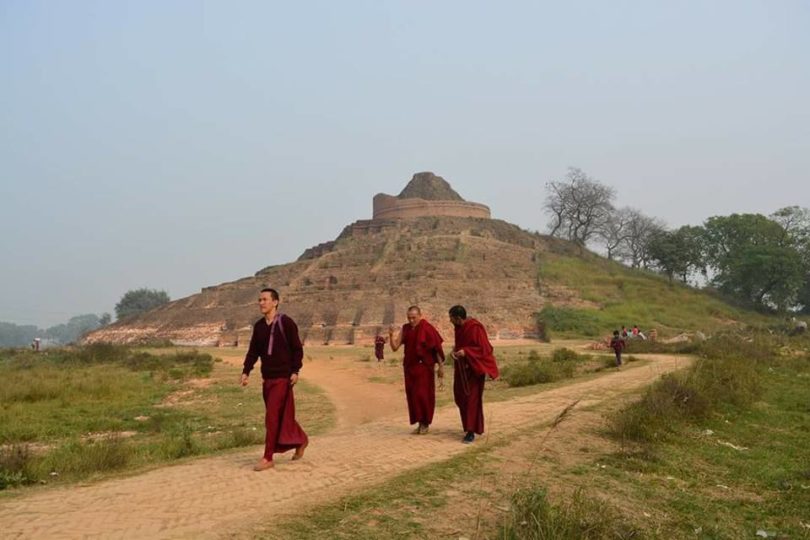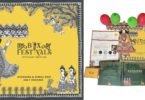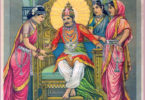It was an evening of pluvial delicacy. The monsoon had set in. In the month of Sravan the sky was overcast with dark rain clouds. There was a drizzle. The mango grove, beside which in a cottage, Buddha was staying with his disciples, was thoroughly rain washed. The kadamba trees standing in a cluster beside the path which went towards the village of Dasharna were in full bloom, and drenched in rain.
Buddha came here every year for his retreat during the monsoon months. That evening he was sitting inside the cottage on a mat spread out on the floor. An earthen lamp was lit in the corner of the room. Buddha was gazing steadily at it, lost in thought. His five disciples sat in a semi-circle in front of him. They were talking in a very low tone among themselves. Uttiya was the youngest among them. He was thirty-five, strong and well built, had a face with well-defined features, and a pair of brilliant eyes that shone brightly whenever the lamp light fell on them.
Buddha’s voice, deep and melodious broke the silence of the room. He said “Impermanence is inherent in all things. Work for thy own salvation with diligence. Atma deepo bhava. Be a lamp unto thyself, and dispel the darkness of ignorance with the light of your knowledge. Try and find out the truth.” The five disciples grew silent with attention. They listened with deep concentration as Buddha went on with his discourse. The crickets’ chirping outside also grew holy suddenly. It appeared that they were chanting in a chorus “Buddham swaranam gachami/Buddham swaranam gachami/”
In a house in the village Madhavi was singing a lullaby to her son trying to soothe him into sleeping, listening to the rain drops falling on the roof. Pitter, patter, pitter, patter, it was going on. She had finished cooking their evening meal, for herself and her mother-in-law. Her husband, father-in-law, and a young brother in law, were traders who had gone to far away lands to sell their merchandise of silk, sandal wood, spices, precious stones and ornaments, but would return home, as they always did at the onset of the monsoon. Madhavi was a very good and careful housewife, who looked after the household and her mother-in-law and son, without giving the two any reason to complain. She was comely, and modest in her demeanor.
The next day, the rain had stopped in the morning. There was a dazzling sun, but a cool breeze was blowing from the south. Madhavi had gone to the pasture land where she had sent her cows, to give them their mid-day food of rice water. She was returning along the village path with a brass pail in her hand. She was walking fast, though the path had grown slippery with mud and slush due to the rains. She was lost in thought, and walking with her head bowed down. Suddenly she became aware of a shadow falling in front of her on the path. She quickly looked up and saw a young Buddhist monk in an ochre robe, with a begging bowl, coming from the opposite direction. She took a step or two forward but tripped, and would have fallen, but was saved from falling by a very strong arm that gave her a support.
Madhavi blushed with embarrassment, but could not detach herself from that strong arm that closely touched her own left arm. She felt it was so warm and soft. She could even sense how the warm blood was gushing down the veins of the other’s arm. Or was it her own? She could not distinguish, as the two arms were so firmly set against one another that the two had turned into a single living entity. Madhavi thought that the earth had stopped on its diurnal course and there was no making of time. The moment had turned into an eternity. Madhavi looked up, and saw the handsome face, pure with compassion, and two bright eyes looking into her own. He soon detached himself, and went on his way, after smiling tenderly at her, and blessing her with his raised palm. It was Uttiya going to a nearby village for collecting his day’s alms.
Returning home, Madhavi finished her chores, but the image of herself and the monk under the dazzling sun haunted her memory. The next day, she started making mistakes in her household chores. It was totally unexpected in one who was so orderly, and quietly efficient. She forgot to carry her towel to the village pond, when she went to bathe, and returned home with water dripping from her whole body. The rice was over cooked, the gourd not boiled enough, the milk had no sugar in it, and Madhavi bowed her head in shame, when her mother-in-law asked what was wrong with her. She, however, soon steadied herself, after a few more embarrassing days. The days again got curtained in heavy downpours. Soon her husband with his father and brother returned home, and her days were spent in ceaseless activities, cooking, washing, keeping everything clean, and looking after her husband and child. Yet at some quiet moment, sitting at the window, watching the rains, when the fragrance of some wild unknown flower being bathed in the shower wafted into her room in the still, darkening evening, she remembered the young monk, and her heart grew warm.
One day her mother-in-law brought the news that Buddha was giving sermons sitting under a huge mango tree in the mango grove, and even lay women were allowed to listen to him, she decided to go there with her. It was another rain less evening of that month. When Madhavi went to the mango grove with her mother in law, where Buddha was preaching his dhamma, she found that many men and women from the surrounding villages had flocked there to listen to Buddha. The enlightened one was sitting on a round piece of rock, under a mango tree, and at his feet were the people, sitting in rapt silence, looking at his radiant face. Madhavi and her mother-in-law went and sat among the group of women.
Thus spoke Buddha “He who fills his lamp with water will not dispel the darkness, and he who tries to light a fire with rotten wood will fail. And how can anyone be free from self by leading a wretched life, if he does not succeed in quenching the fires of lust, if he still hankers after either worldly or heavenly- pleasures. But he in whom self has become extinct is free from lust: he will desire neither worldly nor heavenly pleasures, and the satisfaction of his natural wants will not defile him. However, let him be moderate, let him eat and drink according to the needs of the body.” He explained that pain that haunts man in every walk of his life is born of desire. So man should try to free his self from desire by following the eight fold path, and he promised to explicate the next day, what this eight fold path was, and dissolved the assembly.
Madhavi came there every day. She sat with the crowd and listened to Buddha. In her heart of hearts she had a secret desire to meet the monk who had saved her from falling. But it was so deeply hidden, that she herself was not really aware of it. And she met him one day. Every morning she bathed in the village pond, collected lotuses from there, which she took to the Buddha, for Buddha loved lotuses. She was returning with her bunch of flowers, when she saw Uttiya coming along the village path. On that day he was not alone but accompanied by two other monks. When they were passing her, Uttiya recognized her, smiled, and asked “Lady, for whom are the lotuses?”
“For Buddha”, she replied. Uttiya smiled and went away on his way.
Visiting Buddha, listening to his words, and later reflecting on them, became Madhavi’s daily practice. It brought her immense peace and joy. Yet she yearned to see another one, hear his voice, and feel that warm touch that thrilled her whenever she thought of it. Was this a desire that was the cause of sorrow of which Buddha talked? Should she get rid of it? Madhavi thought, but did not know how. She wanted her life to be pure and holy.
It was a moonlit night. The sky was clear of any rain clouds. A soft whispering breeze was blowing. Madhavi was returning home after offering Buddha and his disciples a dinner of rice and milk pudding she had prepared and which was Buddha’s favorite food. Uttiya too, was returning from an errand on which Buddha had sent him to some distant village. He was tired and hungry. The monk and the woman came face to face in the mango grove. They both looked into one another’s eyes. The moonlight filtered in through the thick mango leaves and branches swayed by the wind. Now Madhavi could feel what desire was. Her whole body was set on fire burning with desire, willing that the monk would encircle her with his arms and draw her towards him. She remembered Buddha’s words – “Everything is burning. What is everything that is burning? The eye, is burning, form is burning, eye-consciousness is burning, eye-contact is burning. The feeling that arises dependent on eye-contact, whether pleasant, unpleasant, or neutral, that also is burning. With what is it burning? It is burning with the fire of passion, the fire of hatred, the fire of delusion. I declare that it is burning with the fire of birth, decay, death, grief, lamentation, pain, sorrow, and despair.”
Her eyes were like flames of earthen lamps in a windy place, restless with passion. But Uttiya’s eyes were calm and still like a blue lake reflecting the sky. He had learnt to burn away his desire because it only led to sorrow. Still he was charmed by the beautiful form in front of him. He was young, and she was beautiful and he could not help looking at her. At that moment an owl hooted on the mango tree. Madhavi shuddered, Uttiya recollected himself, and asked “Bhadre, shall I see you Home?”
“No, no, you are tired with walking. I will go on my own”, Uttiya smiled his benign smile and walked towards their rain retreat where Buddha was waiting for him.
The rains had come to an end. The blue sky was covered with white fleecy clouds that heralded the coming of early autumn. The paddy fields of the village were green with the rice plants that looked like the waves of a sea, whenever the breeze swayed them. Buddha and his five disciples were leaving Dasharna and taking to the roads again. They were walking in a file. Madhavi watched them from the window of her room. Tears welled up in her eyes, but she wiped them away, and knew that they will return some day, when the monsoon will set in and till then she will try to find out how to burn away desire, that was at the root of all sorrow.
—
This story was submitted as part of the #StoriesInArt blogging competition. Read other shortlisted entries here.
(Image submitted by author. Credit: @bihartourism)





